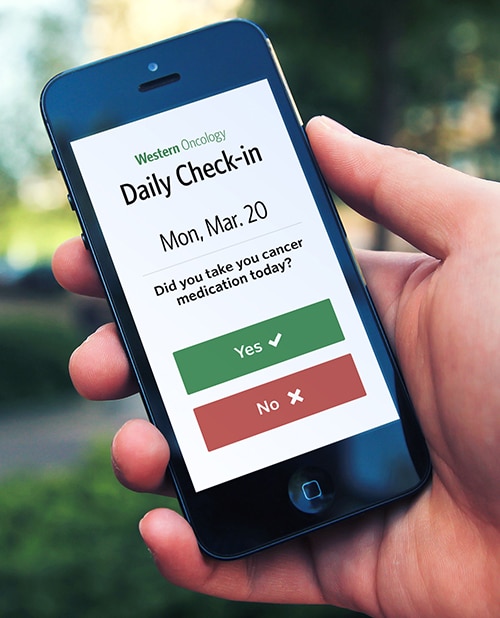Remote Monitoring and Patient Reported Outcomes

As many cancer care providers recognize, one thing that could be vastly improved in the current care model is understanding what chemotherapy patients are experiencing between clinic visits. Knowing if the patient is experiencing an adverse event or not taking their medication and being able to intervene in a timely way can be the difference between a good and bad outcome. So why are patient-reported outcomes so under-utilized?
In a perspective recently published in the New England Journal of Medicine, Ethan Basch, MD, MSc, who it the director of the UNC Lineberger Cancer Outcomes Research Program, outlined the opportunities of and barriers to patient-reported outcomes. His research found that collecting patient-reported outcomes resulted in fewer hospitalizations, better medication adherence and improved quality of life, but it also identified several significant barriers including unengaged patients, cost, a lack of financial incentives and implementation.
At Navigating Cancer, we work to create products that solve real world problems and we know that integrating patient-reported outcomes into the care model can make a significant impact on patients outcomes. We are also sensitive to the very real barriers identified by Dr. Basch. To address the gap, we developed Health Tracker, an easy to use application for smartphones that allows the care team to remotely monitor patient symptoms and side effects. The app regularly prompts patients who are undergoing chemotherapy to report side effects, confirm medication adherence and gives them an opportunity to request a call back. Each patient’s information is surfaced onto a risk-stratified Triage dashboard so staff can monitor or intervene as necessary. When the care team is fully informed about their patients – both at the clinic and away from it – the result is fewer hospitalization and more successful treatment outcomes.
In addition, when the patient has this direct connection to their care team, engagement improves – they feel connected and cared for and can play an equal role in their own care, improving self-care and satisfaction with their care team.
While barriers exist for this type of connected care, consider how Health Tracker can help you overcome them:
A patient-centered approach enables engagement.
Once a patient is registered in Health Tracker, all they have to do is respond to a text message. They will receive three prompts for patient-reported outcomes:
- Did you take your medication?
- Are you experiencing and side effects? (if yes, patients can report them right then)
- Would you like a call back from the care team?
This ensures that the care team is immediately alerted if a patient is experiencing anything that requires intervention. The care team can also use the PROs to decide if a particular patient should be moved into a high-risk “watch closely” category.
The benefits outweigh the cost.
We recognize that there is a cost associated with Health Tracker and the incentives in current reimbursement models aren’t great when it comes to remote monitoring. However, if you consider the benefits identified by Dr. Basch’s research – fewer hospitalizations, improved adherence, better outcomes, and more – it’s easy to see that savings would far outpace the cost. In addition, engaged patients do better, they are able to administer self-care more accurately and that means less work for the care team. Health Tracker is a simple, but powerful engagement tool to keep patients in touch with their care team. In addition, this digital solution allows the care team to document the time spent on triage and managing patient-reported outcomes for reimbursement and, while it may not be equal to the effort at this point, that is sure to expand as the evidence grows to support PROs.
Navigating Cancer can guide the integration into your workflow.
One of the hardest parts of adding a new technology tools is certainly the impact to your workflow. We have implementation specialists who understand workflow and have helped lots of clinics adjust their workflows to incorporate new tools in a seamless way that does not negatively impact the patient experience. Yes, your staff may have to make some adjustments, but if you focus on communicating the benefits – both near and long term – the care team will come along. Health Tracker not only improves the patient experience, it also keeps the care team in direct communication with each other and the patient without consuming extra resources.
If you would like to learn more about Health Tracker, contact Navigating Cancer today!